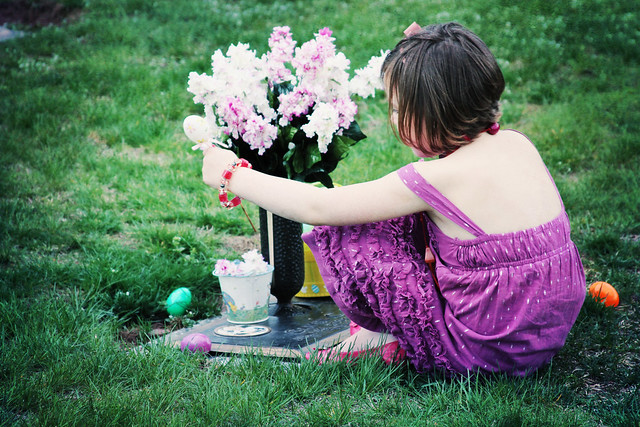For Christians, the Easter egg is symbolic of the resurrection of Jesus Christ. Painting Easter eggs is an especially
 beloved
tradition in the Orthodox and Eastern Catholic churches where the eggs
dyed red to represent the blood of Jesus Christ that was shed on the
cross. Easter eggs are blessed by the priest at the end of the Paschal
vigil and distributed to the congregants. The hard shell of the egg
represents the sealed Tomb of Christ, and cracking the shell represents
Jesus' resurrection from the dead. Moreover, historically Christians
would abstain from eating eggs and meat during Lent, and Easter was the
first chance to eat eggs after a long period of abstinence. (Orthodox
Christians continue to abstain from eggs during Lent.)
beloved
tradition in the Orthodox and Eastern Catholic churches where the eggs
dyed red to represent the blood of Jesus Christ that was shed on the
cross. Easter eggs are blessed by the priest at the end of the Paschal
vigil and distributed to the congregants. The hard shell of the egg
represents the sealed Tomb of Christ, and cracking the shell represents
Jesus' resurrection from the dead. Moreover, historically Christians
would abstain from eating eggs and meat during Lent, and Easter was the
first chance to eat eggs after a long period of abstinence. (Orthodox
Christians continue to abstain from eggs during Lent.)The Christian Church officially adopted the custom, regarding the eggs as a symbol of the resurrection; in 1610 A.D., Pope Paul V proclaimed the following prayer:
Bless, O Lord! we beseech thee, this thy creature of eggs, that it may become a wholesome sustenance to thy faithful servants, eating it in thankfulness to thee on account of the resurrection of the Lord.
Easter Egg Hunt. Our Easter Egg Hunt marks the start of spring and it's always held outside if possible; this
 means
the grass is greening, azaleas are blooming and the spring flowers
brighten the back yard. Each child has their own Easter basket that has
been theirs for years. The grandchildren and their parents go first
and we all gather on the patio to see what treasures have been left by
the Easter Bunny. Then it's time for the grandchildren to hide the
plastic eggs for their parents to find. Each plastic egg has money in
it, ganging from $1.00 to $100.00 the parents have 10 minutes to find
the eggs. What they find they keep. What they don't find the
grand-kids share. The competition is keen and suspense mounts as the
time runs down.
means
the grass is greening, azaleas are blooming and the spring flowers
brighten the back yard. Each child has their own Easter basket that has
been theirs for years. The grandchildren and their parents go first
and we all gather on the patio to see what treasures have been left by
the Easter Bunny. Then it's time for the grandchildren to hide the
plastic eggs for their parents to find. Each plastic egg has money in
it, ganging from $1.00 to $100.00 the parents have 10 minutes to find
the eggs. What they find they keep. What they don't find the
grand-kids share. The competition is keen and suspense mounts as the
time runs down.Visiting the graves of family members. Visiting graves is a tradition dating back centuries in the US, a custom allowing families not only to grieve but to honor and celebrate the lives of

those that have passed. Many families pay respects at cemeteries on Easter as well as on Memorial Day. I think it's important to maintain a connection with those who came before us and blazed the path that we currently walk on. This is a message that can be delivered to children with a morning visit to decorate the graves of our relatives and friends. Easter is the perfect time to do this and create a family tradition.
Other Easter traditions include:
- Rolling Easter eggs down a hill, symbolizing the removal of the stone that blocked Jesus' tomb.
- Enjoying the Passover service together, including prayers, scripture readings, songs, hand washing, a meal (including the eating of hard-boiled eggs as a symbol of the renewal of springtime), eating of green and bitter herbs, unleavened bread, and wine (fruit of the vine).
No comments:
Post a Comment